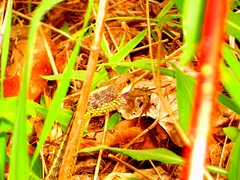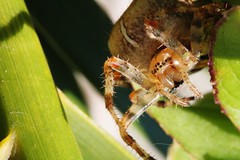A worm farm could be a great investment for a little extra income as a first business for a young entrepreneur. A young person with access to a big backyard, who lives in the country or a young person who lives on a farm might find worm farming a great way to get their first experience with business management. Even a child who lives in the city can start a small worm farm if they have a flower bed-sized area to begin. Town folk like to fish and garden, too.
Suppose you're looking for something to occupy your spare time during your retirement years? Worm farming on a small scale may be just the thing to keep you busy, to give you an activity that keeps you close to nature, can provide extra income, and can be less demanding physically.
Worm farming could be a great interest to share with your young grandchild. You could try it as a way to gain popularity among your fishing buddies or with your gardening friends.
Shelter for your worm farm is important for several reasons. Shade from the sun, cover from the rain (you wouldn't want your investment to drown or be washed away), and protection from reptiles and birds are important reasons to have good shelter.
Worms go dormant in the winter. You'd have to keep them in a controlled environment to sell them year-round. Sheds, barns, or basements that allow for temperature control are some ideas.
Make sure you consider packaging costs. The right packaging for your worms, their castings, or the tea you can make with the drain water could help improve your businesses chance for success. Informative and/or attractive packaging can help spread your trademark to solidify your image in the public eye. But when you first start out, you'll want to keep your overhead as low as possible, so choose your supplies wisely so your extra income will be more lucrative.
Plant nurseries, feed stores, or hardware stores are some ideas for places to contact about allowing you to sell your products from your worm farm. You may be able to sell on a consignment basis. You could rent a booth at a flea market to get a start on selling your products. To make extra income, you have to be willing to let go of some first!
You might try making a deal with a local livestock farm to trade some fishing worms for manure to help feed your worms. Just make sure there's no residue left in the manure that would kill your worms. If the animals have been wormed recently, or if they have parasites of the wrong kind, it could wipe out your stock. Chicken manure may be the least attractive manure since it tends to be "hot". Also, remember not to use fresh manure. It's better if it has aged for a few weeks.
Some people enjoy worm farming as a way to manage their stress levels. They find it relaxing to harvest the worms. Just as people find relaxation in gardening or bird-watching, worm farming can relieve tension and give you an outlet to focus on. It may even be a way to help your child make new friends with the kids on the block!
Showing posts with label Manure. Show all posts
Showing posts with label Manure. Show all posts
Friday, 17 February 2012
Sunday, 8 January 2012
Worm Farming is a Fisherman's Friend
 Image by Getty Images via @daylifeRed worms, red wigglers, or manure worms are said to be best for composting. They're also known as fishing worms. You can find them in leaf litter, manure piles, and bait shops.
Image by Getty Images via @daylifeRed worms, red wigglers, or manure worms are said to be best for composting. They're also known as fishing worms. You can find them in leaf litter, manure piles, and bait shops.The ability to produce fast makes these worms appealing for worm farmers and fishermen.
You can start your red fishing-worm farm in a small, cheap plastic container such as a margarine dish or cool whip container. Start with a small collection, say....under a dozen, just to get a feel for the journey ahead and decide if you want to invest further. Add at least one big spoonful of dirt or compost, some thin strips of notebook paper or newspaper (not glossy), a cup of water (you want moisture, not soggy contents), fine sand or crumbled eggshells, and a little cereal or fruit. (The worms aren't as partial to citrus fruits because of the acid content.)
You'll have to punch holes in the sides and the lid, at least a dozen in each. There must be oxygen flow and drainage. Worms can't survive without oxygen. And you may have noticed that they rise to the top of the ground after a hard rain.
Your worms will eat many things that you would normally throw away. Almost any food scrap will do, but there are some that are discouraged. Meat scraps, citrus scraps, garlic, onion, and hot peppers or really spicy foods are not good choices. You should be careful about exposing your worms to pesticide residues used on food or contained in manures. Although the fishermen's friend will eat cardboard because it's a wood product, make sure the cardboard is not contaminated with any poisonous residues. You have to feed them at least three times a week. Bury the food under the bedding for the best results.
You can check out bait shops to get an idea of how much to price your worms if you plan to sell them. You don't want to be too high or too low compared to other worms sold in the area for fishing bait. You can, of course, just grow them for your own fishing excursions. Also, consider the area where you live. If you live in a small area, there may not be enough market for a large worm farm to earn enough profit unless you sell over the internet or ship to other places. You want to make sure you don't invest too much too soon.
If you live near a lake, you may do very well with your worm farm business. People do like convenience. Even avid fishermen can run out of bait or forget to buy it, although they may not like to readily admit it! There are plenty of people who prefer to use natural bait, too. Of course, this means customers will be knocking on your door on weekends and after normal work hours. So, you may do better to post your office away from your living area and make sure your hours are compatible, but not overwhelming for you. Post them plainly and large enough for those early rising fishermen/women to readily see them.
Labels:
Agriculture,
Compost,
Fishing,
Food,
Home and Garden,
Manure,
Worms,
Worms Germany
Tuesday, 20 December 2011
Worm Farming Predators
 Image by ilselieve via Flickr
Image by ilselieve via Flickr Image by spacepleb via FlickrIt may seem ironic that the very animals you may produce your worms for would also be the predators you have to protect your worm farm from. If you just give the worms away to the predators, there isn't much point in trying to raise them for profit by selling them to the people or businesses that use them to feed the very same types of predators!
Image by spacepleb via FlickrIt may seem ironic that the very animals you may produce your worms for would also be the predators you have to protect your worm farm from. If you just give the worms away to the predators, there isn't much point in trying to raise them for profit by selling them to the people or businesses that use them to feed the very same types of predators!You must keep other things from harming your worm farm, of course. One of those things is the medication residue that is left in the manure you may get from livestock farms to feed your worms. Allowing children unsupervised access to your worm farm could be hazardous for your worms.
Improper drainage is not a good thing for your worm bins. Using contaminated water to keep your beds moist is harmful. Using paper or cardboard shreds that have come in contact with pesticides is another bad idea.
But the predators can be fierce source of competition for any farm, including your worm farm. Many types of birds enjoy worms. Moles, hedgehogs, foxes, toads, snakes, beetles, leeches, slugs, and parasites all feed on worms. Parasites are another reason you have to be careful with the manure you feed your worms. Mites and cluster flies can be hazardous predators to your worms.
Anything that is a threat to eating the food you feed your worms can be a danger as well. Worms are voracious eaters, so if they aren't fed enough, they'll suffer or try to leave your worm beds. If another predator is eating up the food they need, you could suffer a great loss even if they aren't interested in eating the worms. If you have raccoons in your area, this may present a problem since raccoons are known to be great at getting into containers and figuring out latches!
There's nothing wrong with feeding birds even when you won't be making a profit from it. But you may want to encourage the birds to eat in other areas of your yard to distract them away from your worm beds.
If you have to worry about the neighborhood in which you live or if you live close to a public area, you may want to protect your worms from another type of predator. Thieves who want free fishing worms could present a problem. Sometimes even living in the country isn't a guarantee that you won't have trespassers. So, make sure your access to the worm bins doesn't make it too easy for unwanted visitors of any kind!
One way to protect your worm farm from predators is to invest in a shed that can be locked and is constructed to make unwanted access more of a challenge. Small birds can get into small places. If you can keep the floor clean, it helps guard against invasion as well. A concrete floor could be hosed off easily. You'll have more success at protecting your investment if you keep the container they are in off the floor by using something to provide legs of some sort that can also be set in a bowl of water.
Labels:
Agriculture,
Animal,
Bird,
Compost,
Home and Garden,
Manure,
Shopping,
Worms
Subscribe to:
Posts (Atom)
Popular Posts
-
Pengenalan Ikan Keli Ikan keli dikenali sebagai ikan yang berbisa dan mempunyai sengat, rupa bentuknya seakan akan ikan sembilang c...
-
"Tunjuk Ajar Langkah Demi Langkah Bagaimana Memulakan Perniagaan dalam Bidang Penternakan Ikan Keli dengan Mudah seterusnya Menj...
-
PANDUAN MENTERNAK AYAM KAMPUNG TEKNIK MENTERNAK DAN MEMELIHARA AYAM KAMPUNG TUJUAN MEMELIHARA AYAM KAMPONG Adalah untuk mengg...
-
Awek Jepun makan katak hidup-hidup tanpa rasa geli,laju je awek ni makan berselera je........sampai tak nampak mak mentua lalu di belakang....
-
Rahsia Kambing Ketahui langkah demi langkah, bagaimana anda boleh memulakan penternakan kambing dengan mudah dan menjadi seorang penterna...





